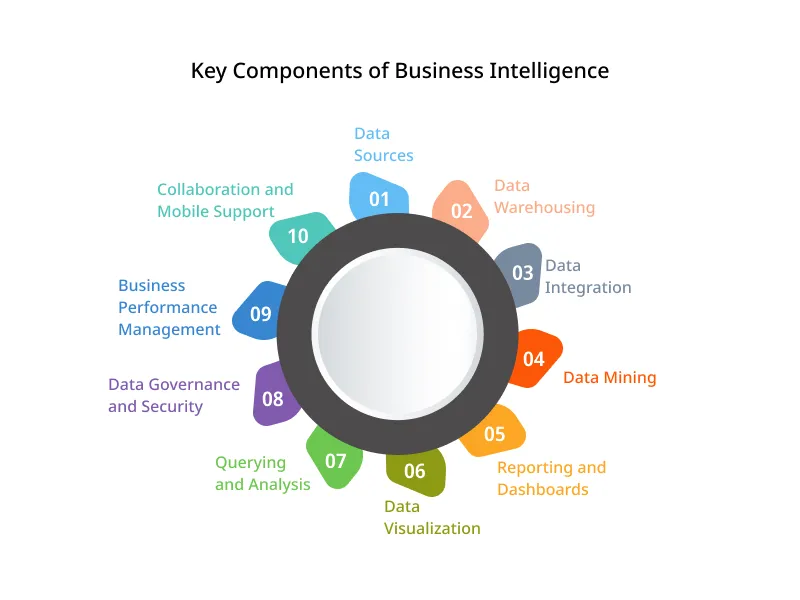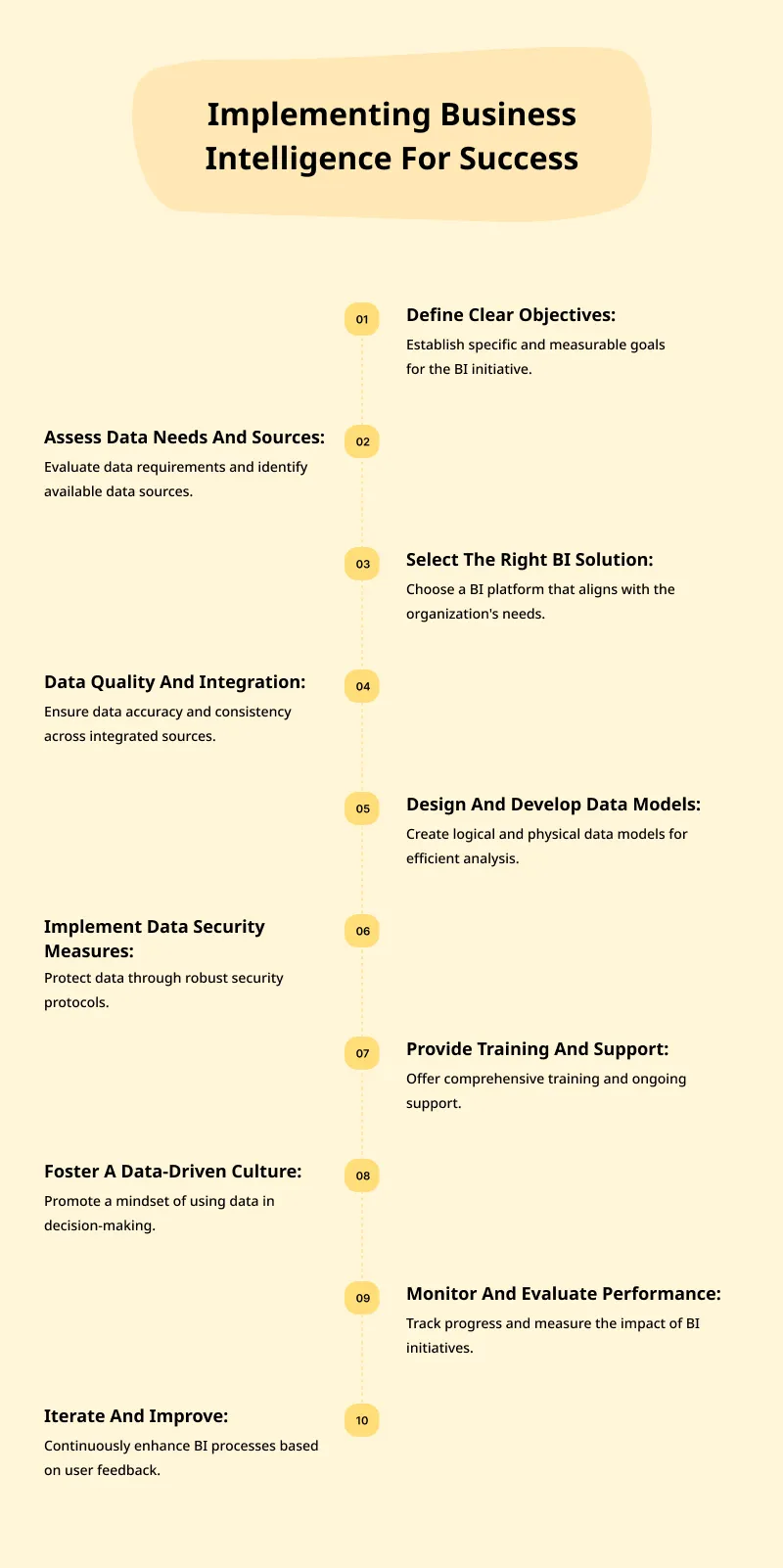In an era where data is the new currency, harnessing the potential of BI has become imperative for businesses to drive growth, increase efficience, and gain a strategic edge. But how exactly does BI revolutionize businesses?
Picture this: seamlessly integrating data from various sources, unveiling hidden insights, and transforming them into actionable strategies.
In this blog post, we delve into the transformative impact of BI on organizations. We will unravel the secrets behind its ability to address pain points, empower data-driven decision-making, and propel businesses toward unprecedented business intelligence success.
Understanding Business Intelligence
Business Intelligence (BI) is a concept that uses data and analytics to make informed decisions. It enables organizations to gather, analyze, and interpret data from various sources. BI aims to provide insights and actionable information to drive business performance and success.
Business Intelligence consulting helps businesses understand their operations, market trends, customer behavior, and competition. It involves collecting data from different systems and sources, such as databases, spreadsheets, and cloud services.
Once the data is collected, it cleans, transforms, and integrates to ensure accuracy and consistency. BI tools then analyze this data, uncovering patterns, trends, and relationships. For easy understanding, it presents the results through visualizations, such as charts and graphs.
BI enables businesses to identify opportunities, make data-driven decisions, and optimize their operations. By leveraging Business Intelligence consulting, organizations can gain a competitive advantage in the market. It is used across various industries and sectors, including finance, healthcare, retail, and manufacturing.
It helps businesses monitor key performance indicators (KPIs) and measure progress towards goals. BI also supports forecasting, risk analysis, and strategic planning. Ultimately, BI empowers businesses to extract valuable insights from data and make informed decisions to drive success through business intelligence.
Key Components of Business Intelligence
The key components to consider for Business Intelligence success include:
Data Sources
- Identify and gather relevant data from various sources such as databases, spreadsheets, cloud services, social media, and external APIs.
- Ensure data quality and consistency through data cleansing and integration processes.
Data Warehousing
- Design and build a centralized data repository (data warehouse) to store and organize large volumes of structured and unstructured data.
- Implement data modeling techniques for efficient storage and retrieval.
Data Integration
- Integrate data from disparate sources into a unified format within the data warehouse for business intelligence success.
- Use Extract, Transform, Load (ETL) processes to extract, clean, transform, and load data into the warehouse.
Data Mining
- Apply data mining techniques to discover patterns, trends, and relationships in the data.
- Use statistical analysis, machine learning algorithms, and predictive modeling to extract valuable insights.
Reporting and Dashboards
- Develop visually appealing and interactive reports and dashboards to present data in a user-friendly format.
- Enable users to access key performance indicators (KPIs), metrics, and visualizations to monitor business performance.
Also Read: The Future Of Business Intelligence: What To Expect In The Coming Years
Data Visualization
- Utilize visual representations such as charts, graphs, and maps to communicate complex data effectively for business intelligence success.
- Enable users to explore data visually and gain actionable insights at a glance.
Query and Analysis
- Provide ad-hoc querying capabilities for users to explore data and generate custom reports.
- Support interactive analysis and drill-down capabilities to investigate specific aspects of the data.
Data Governance and Security
- Establish data governance policies and procedures to ensure data quality, integrity, and compliance.
- Ensure sensitive data is protected and control access rights.
Business Performance Management
- Align BI initiatives with organizational goals and strategies for business intelligence success.
- Monitor and measure key business metrics to track performance and make data-driven decisions.
Collaboration and Mobile Support
- Enable collaboration among users by allowing data sharing, annotations, and discussions.
- Provide mobile access to BI tools and reports, allowing users to access insights on the go.
These components work together to create a comprehensive Business Intelligence solution that empowers organizations to extract meaningful insights, make informed decisions, and drive business growth.
Reach out to ValueCoders for proven BI solutions
Implementing Business Intelligence for Success
Implementing BI is crucial for organizations seeking to leverage data-driven insights and drive business intelligence success. Let’s explore the critical steps in implementing BI effectively and discuss how each step contributes to achieving business goals and ensuring long-term growth.
- Define Clear Objectives
Defining clear objectives is crucial for business intelligence successful implementation. It involves clearly articulating the goals and outcomes the organization aims to achieve through BI. By setting specific, measurable, achievable, relevant, and time-bound (SMART) objectives, organizations can provide clarity and focus to their BI initiatives. Clear goals help align the efforts of all stakeholders and provide a benchmark for measuring success.
- Assess Data Needs and Sources
Assessing data needs and sources involves understanding the data types required to support BI initiatives and evaluating existing data sources within the organization. This process helps identify gaps in data availability and determines whether additional external data sources are needed. By comprehensively assessing data needs and sources, organizations can ensure they have access to the right data for analysis and decision-making.
- Select the Right BI Solution
Selecting the right solution recommended by a Business Intelligence consulting company is crucial for a successful implementation. It involves evaluating different BI solutions based on specific requirements, budget, scalability, and ease of use. Organizations should consider factors like data integration capabilities, visualization capabilities, and vendor support. Choosing the right BI support to ensures the platform aligns with the organization’s needs.
- Data Quality and Integration
Data quality and integration are vital components of a successful Business Intelligence implementation. Data quality refers to ensuring data accuracy, completeness, and reliability. Organizations must implement data-cleansing processes to eliminate errors and inconsistencies.
Data integration involves bringing together data from various sources into a centralized repository, ensuring that data is consistent and can be seamlessly analyzed. High-quality and integrated data forms the foundation for reliable insights and decision-making.
- Design and Develop Data Models
Data modeling is an essential step in BI implementation. It involves designing and developing logical and physical data models that align with the organization’s business objectives.
Logical data models define the relationships between different data entities, while physical data models define how the data is stored and accessed. Well-designed data models facilitate efficient data storage, retrieval, and analysis, enabling organizations to derive meaningful insights from their data.
- Implement Data Security Measures
Implementing data security measures is critical to protect sensitive information and achieving business intelligence success during the implementation process. Organizations must establish robust security protocols to ensure data confidentiality, integrity, and compliance with relevant regulations.
This includes implementing access controls, encryption mechanisms, and other security measures. Data security measures instill confidence in stakeholders and protect against potential breaches or unauthorized access to data.
- Provide Training and Support
Providing comprehensive training programs and ongoing support is vital for successful BI implementation. Training programs should educate users on effectively using the chosen BI solution, including data visualization techniques, report generation, and data exploration.
Ongoing support and resources, like user guides and help desks, should be available to address user queries and challenges. Training and support foster user adoption and maximize the benefits of BI implementation.
- Foster Data-driven Culture
Fostering a data-driven culture is critical to achieving business intelligence success and ensuring the long-term effectiveness of BI implementation. It involves creating an organizational environment that values and utilizes data in decision-making processes.
This can be achieved by promoting data literacy, encouraging employees to seek insights from data, and recognizing and rewarding data-driven actions. A data-driven culture empowers employees to make informed decisions, fosters collaboration and drives continuous improvement.
- Monitor and Evaluate Performance
Monitoring and evaluating the performance of BI implementation is essential to measure progress towards defined objectives. Organizations should establish key performance indicators (KPIs) and metrics that align with their goals.
Regular monitoring enables organizations to track the effectiveness and impact of their BI initiatives, identify areas of success, and uncover areas that require improvement. Business Intelligence consulting provides valuable insights to make data-driven adjustments and refinements.
Also Read: Mastering Mobile BI Solutions: Top Tools, Benefits & Best Practices
- Iterate and Improve
BI implementation is an iterative process that requires continuous improvement. Organizations should actively seek feedback from users and stakeholders and use that feedback to drive enhancements.
By embracing an iterative approach, organizations can identify opportunities to optimize data analysis, visualization, and decision-making. Iteration and improvement ensure that the BI implementation remains aligned with evolving business needs and maximizes its value over time.
- Scalability and Future Growth
Organizations should choose a Business Intelligence consulting company that can accommodate increasing data volumes, additional data sources, and evolving business requirements.
Scalable infrastructure ensures the organization can handle expanding data and analytical needs while maintaining performance and efficiency. Scalability allows organizations to future-proof their BI implementation and adapt to changing business demands.
By focusing on these critical areas during BI implementation, organizations can build a solid foundation for data-driven decision-making, derive valuable insights, and drive long-term success.
Partner with ValueCoders for strategic business intelligence support
Case Study of Successful Businesses
ValueCoders: Case Study on Business Analytics Solution For LMS Platform.
In this case study, we explore implementing a business analytics solution for a Learning Management System (LMS) platform, highlighting the impact of business intelligence (BI) on driving success in today’s market.
Our client, a leading provider of online learning solutions, sought to optimize their platform’s performance, enhance course engagement, offer personalized learning experiences, and measure ROI.
The client achieved remarkable results by integrating data sources, establishing a centralized data warehouse, creating interactive dashboards, and leveraging advanced analytics techniques. ValueCoders improved platform performance, increased course engagement and completion rates, delivered personalized learning experiences, and demonstrated measurable business impact.
This case study showcases how BI is transforming the online learning industry and driving success for organizations.
Other Real-World Examples of Successful BI
1. Starbucks
Starbucks, the renowned coffeehouse chain, has utilized Business Intelligence consulting to understand customer preferences and optimize its operations. By integrating data from various sources, including point-of-sale systems, loyalty programs, and customer feedback, Starbucks generates insights to drive decision-making.
Starbucks delivers an exceptional customer experience, leading to increased customer loyalty and revenue growth through personalized offers, targeted marketing campaigns, and menu optimization based on customer preferences
2. American Express (AMEX)
American Express (AMEX) is a leading financial services company that has embraced BI to enhance customer experience and combat fraud. By employing advanced analytics and machine learning algorithms, AMEX analyzes transactional data, identifies spending patterns, and detects anomalies in real-time.
This allows them to proactively address potential fraud, protect cardholders, and deliver a seamless and secure payment experience. Additionally, AMEX utilizes BI insights to offer personalized rewards and recommendations, increasing customer satisfaction and loyalty, ultimately leading to Business Intelligence success.
3. Delta Airlines
Delta Airlines, one of the largest global airlines, has harnessed the power of BI to optimize operations and enhance the passenger experience. Delta Airlines gains insights into operational efficiencies and passenger preferences by integrating data from multiple sources, such as flight schedules, customer feedback, and operational metrics.
This enables them to streamline processes, optimize flight routes, allocate resources effectively, and provide personalized services to passengers. By leveraging Business Intelligence consulting, Delta Airlines has achieved cost savings, improved on-time performance, and increased customer satisfaction.
Connect with ValueCoders for expert BI consulting
Conclusion
Business intelligence (BI) is a game-changer in today’s cutthroat market, propelling organizations toward unparalleled success. By harnessing data-driven insights, businesses can unlock their full potential, make informed decisions, and gain a strategic edge.
Every step of the BI journey is crucial, from defining clear objectives, assessing data needs, implementing robust security measures, to fostering a data-driven culture. Real-world examples like Starbucks, American Express, and Delta Airlines showcase how BI transforms industries and drives business intelligence success.
So, don’t wait any longer—embrace the transformative power of BI and embark on a journey to unlock your organization’s full potential. Take charge, make data-driven decisions, and pave the way to remarkable success in today’s dynamic market landscape!
Ready to harness the power of business intelligence? Contact us today and let our experts guide you toward data-driven success.












